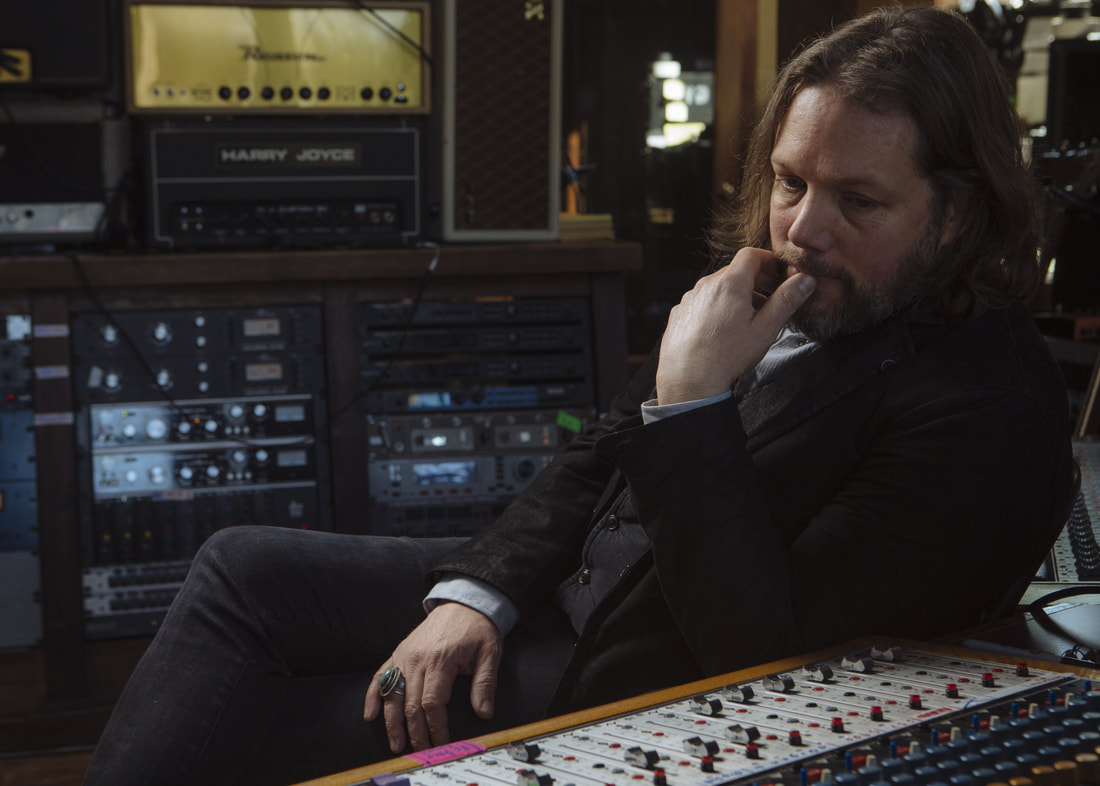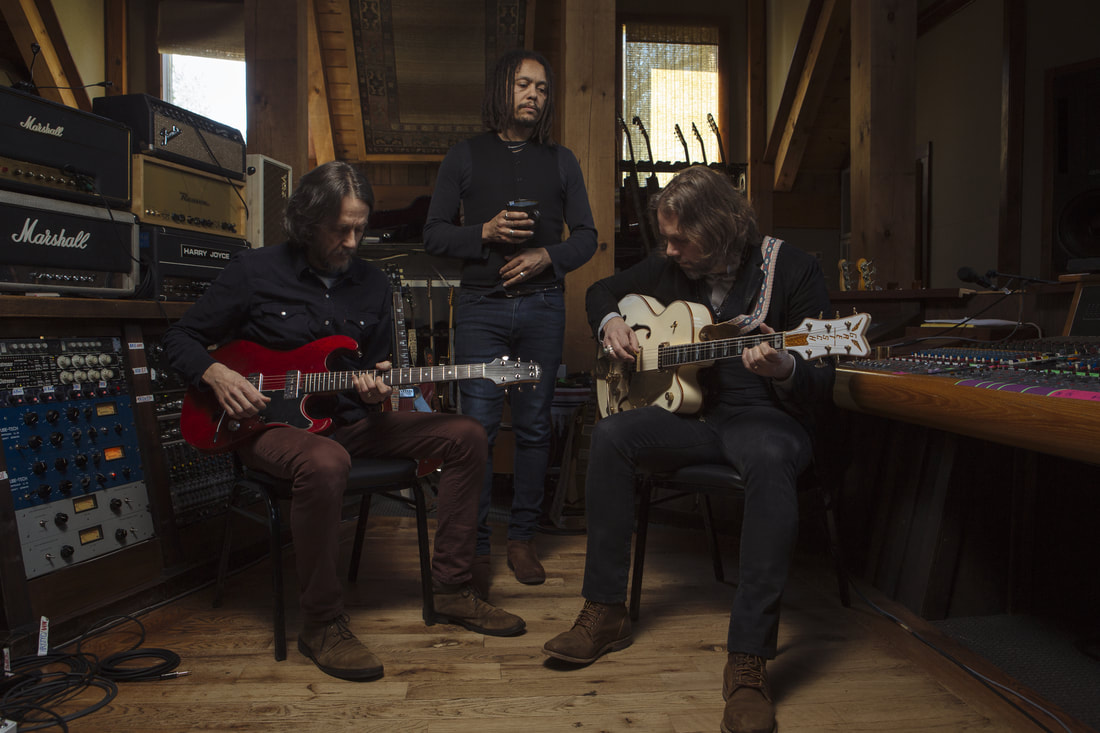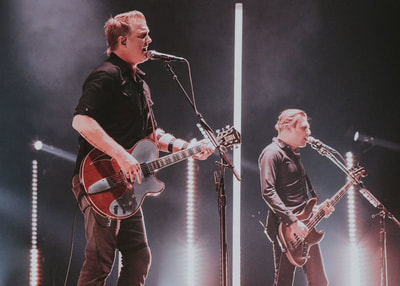|
Former Black Crowe Rich Robinson has returned with new project The Magpie Salute. Steeped in the same southern blues and soul as his former outfit, the just-released ‘High Water I’ doesn’t stray far from the guitarist’s roots. Roping in three of his former Crowes' band mates, along with onetime Hookah Brown singer John Hogg, The Salute may be filled with familiar faces, but they’re “a whole other thing in a different context”. We sat down with Rich for an extended chat about the band, why The Black Crowes are “over”, and retrace a little Crowes history. Seein’ things; Eamon O’Neill.
Hi Rich, how are you today?
I’m good. For me, things are always busy. I have four small children and we’re always chasing someone around, you know? It’s cool. They come with me whenever they can, so it’s great. The Magpie Salute sees you teaming up with three former Black Crowes and also your former Hookah Brown bandmate John Hogg; how did you come to assemble the band? A couple of years ago I was out on my solo tour supporting my record ‘Flux’ [2016], and I had this opportunity to play a show in New York, in Woodstock at the studio that I recorded a couple of records in. Basically, they invite a live audience in to watch you record a live record in front of them. It was a cool thing, and I had done one before, and I was like; “Well let’s try something different”. The older get, the more I play, the more I realise what a gift it is when you have these deep musical connections with people, and Marc Ford and Eddie Harcsh and Sven [Pippen], and all of these guys are those people. Sven was touring with me in my solo band, but I reached out to Marc and Eddie, and they were like; “I don’t care what it is, we’ll come”. I hadn’t spoken to either of them in a while, and it thought it was really cool. Did the prospect of working in a new band excite you? What I liked about it was, bringing those guys with me into a new context, in a new band, with my drummer Joe [Magistro] who they’d never played with, or with Matt Slocum, who they’d never played with, and I thought that that sort of interplay was really interesting. I invited them in, we came down, we did three shows, and over those three shows I did seventy-six songs, and those guys played on about twenty-five of them. We all felt like there was something really special, and we thought; “Let’s do something - play a couple of shows, whatever”. So I planned it and thought about putting up a show for sales, and what songs we should do. It was a very natural process. So that planning led to the first shows? We put up the show in New York for sale, and it sold out in twenty minutes, and then we put three more shows up for sale, and they sold out in twenty minutes, and we were like; “Wow! There’s people that are interested, so let’s go book a tour.” When we booked the tour we realised we had made a record the summer before, in that show in Woodstock [‘The Magpie Salute’ (2017)] – we finished it up and that was really cool, and as we started moving towards putting it together, I decided to reach out to John Hogg [vocalist] who was in Hookah Brown with me, because John and I are great friends and since that band split up, we had wanted to make music again, and this was just the time that it worked out. With the connection to Hookah Brown, as well as the Black Crowes, it’s almost a distillation of your entire musical career, isn’t it? Yeah, it’s surreal sometimes, but in a good way. It’s cool, but what it does is it creates a whole different context that I can get my head around. That’s my favourite thing about the whole thing; having all of these guys that worked with me in these different contexts, to have them all together and then have it become a whole other thing. It must have been difficult losing Eddie Harsch, with his unexpected passing in November 2016. Yeah, it was a blow. We didn’t expect it, and it was definitely a shock. But Ed was one of the most enthusiastic about the whole thing, and, you know, for us, we’re just going to keep going. Those first shows that we played in New York, we turned into a tribute to Eddie. He was a brilliant musician and a great friend to all of us, and it was really sad to see him go. The album ‘High Water I’ is released on 10th August 2018; you must be looking forward to finally getting it released?
Yeah, that’ll be cool. It’s always good to release a record, but what’s really cool is to be able to come out and play these shows that we’re playing in front of bands like Gov’t Mule and Blackberry Smoke, and to have people really get into these songs they’ve never heard – that’s what’s really amazing to see. We’ve had some great responses. I mean, we’re viewing this as we’re a new band. No one wants to be constantly compared to The Black Crowes, or our past or whatever it is. I know that that was a big part of my life, and that was an incredibly successfully band, and I wrote all of that music - I’m proud of what we did as a band, and that was great – but this is something different, although we share a commonality of people. That’s just what we sound like, but this is a new band, and we have a new context too, with someone singing like John who’s different, and Matt Slocum [keyboards] is different, and John Magistro is different, and those three things combined I think really sort of bring it to the next level. The album kicks off with the stompin’ rocker ‘Mary The Gipsy’ and is followed by the acoustic open-tuned title track; would you say these two songs paint a picture of the overall album? Yeah, I mean the cool thing is that there’s so many other things. So there’s something like ‘Sister Moon’ – that was a song that John and Marc had written, and it’s one of my favourite songs on the record, and it’s something unlike I’ve ever done before, and unlike Marc’s ever done before, and that was John’s direct influence on that. On the other side of things there are also plenty of up tempo songs. There’s some cool rock songs; you’ve got ‘Send Me An Omen’ that has elements of where I came from, but then it has this new thing because it has this new thing because of John, and there’s a song like ‘Open Up’ which is different, and ‘For The Wind’ is kind of a powerhouse. The cool thing about it is, when you take it and just lay it all out, it really covers a lot of different styles, but it still sounds like one band making the whole thing. You mentioned the current tour with Gov’t Mule and Blackberry Smoke; you go way back with those guys, don’t you?
Yeah, Gov’t Mule’s first tour ever was opening for us. I think it was on ‘Southern Harmony’ or ‘Amorica’, it was one of those records. It’s cool, it feels great. It feels really cool to get together and play with guys that you’ve known for dozens and dozens of years. We grew up knowing the Turner brothers who are in Blackberry Smoke, and Charlie Starr’s a friend of mine, so that’s really cool. Your current set has seen the band opening some of the dates with Hookah Brown track ‘Omission’. Well, Hookah Brown obviously didn’t release anything, and it was a song that John and I had written a long time ago. I had recorded it, and so I just thought; “Hey, this is cool, let’s put this out as the first sort of original Magpie song”. That’s what we really did. And we changed it a little bit, and so it turned out to be really cool. I look at it like the first Magpie song. We do sometimes look backwards and play some old songs, but right now, we’re most excited about playing this record. Some fans will be hoping that you’ll maybe drop in some Black Crowes material into the set; is that likely? I may throw in a rare song every once in a while, but we’re not interested in the constant comparisons. We’re really happy. Like I said; that band was great, I have the utmost respect and reverence for what we accomplished, the songs were great and I love that band. And last year we spent a lot of time on tour playing Black Crowes’ songs, and playing solo songs because last year was a celebration about the stuff that Marc and I did together in the past, but this year we decided we want to be a band, and we want to step into that role as being a band, and we want to play our music, and that’s really where we are with this. When are we likely to see some Magpie Salute shows in Europe? Well, there’s five shows in August. One of them is in London, and the other four are in Norway, Sweden, Berlin and Amsterdam. Then, we are coming back in November / December for a full band European tour. I wanted to talk to you a little about the classic Black Crowes song ‘She Talks To Angels’; do you remember writing that track?
The first time I heard Nick Drake was in like 1985. A friend of mine gave us this record, it was called ‘Time Of No Reply’, and it was a collection of Nick’s demos and the last five songs he recorded. And in it, ‘Fly’ was the first song that I heard, and the minute I heard that, it hooked me. His way of playing, the sound of his voice and the guitar, and how everything worked together; his timing, and the tuning of the guitars – that’s really what pushed me to start changing tunings of my guitars. It was listening to songs like that, and also Stephen Stills, and even ‘The Rain Song’, and a lot of Jimmy Page stuff; it all stems from a similar place. And so, when I first started messing around with tunings and learning that kind of thing, that was just one of the songs that I came up with when I was really young. Were you surprised by the success of that song, given that it was unlike anything that was around at the time? I never think about that kind of stuff. I mean, I just write some songs and hope that people connect with them, but you never have any idea. We had no idea that anyone would care about that record [‘Shake Your Money Maker’, 1990]. We just went out and did it. The Black Crowes came on the scene during the height of glam metal; did the band’s success in that climate surprise you? Yeah, we were definitely surprised, and Grunge came out a couple of years after us, so we were kind of stuck in the middle. At the time our record came out, it was all what they call ‘Hair Metal’, with these weird bands that put a lot of product in their hair, with tight pants Ultimately, we were interested in music that felt authentic to us and sincere, and a little bit deeper. We grew up loving Crosby Stills and Nash, we loved Bob Dylan, we loved Sly And The Family Stone, we loved The Rolling Stones and Led Zeppelin and The Beatles, mainly because of their sincerity, and it was more about that. We didn’t really think, or put in a context of us being successful; it just kind of happened. So that’s kind of how we looked at it, and it definitely translated; it meant something to people. I mean, even now I look at music, and what inspires me is still, is sincere, authentic music that’s written about the human condition or human experience, or universal human feelings that still affect all of us, no matter how distracted we are with technology. There are these things that are going to keep showing themselves to us as a species, until we figure it out. It was during the grunge era you released your second album ‘The Southern Harmony and Musical Companion’ [1992], which was even bigger than your debut. Well, in Europe it was definitely bigger. Yeah it was in the grunge era, but if you think about grunge, minus bell bottoms – which is what we wore – the majority of what grunge was doing was honouring the bands that they loved. If you look at Soundgarden; they loved Black Sabbath, and they were paying tribute to their favourite band. These bands did look back and look at where they came from, and they were writing real songs; they just dressed a little bit differently. So they weren’t all that different from what you were doing? The genrefication of music sort of became fever-pitched. If you look back at music when the musical wave and the importance of music came about [in the 1960s], it was so broad; rock and roll music was Joni Mitchell, it was Sly Stone, it was The Rolling Stones, it was Humble Pie, it was Bob Dylan, and it was Neil Diamond and Al Green; anyone and everyone in between could fit under that ‘rock and roll’ umbrella. It wasn’t until bankers and people that mainly care the most about money started trying to create ways to package it and sell it, that they really started over-genrefying music. Music is music, you know what I mean? And that’s how I looked at it. Moving on a little, and I wanted to chat a little about ‘The Lost Crowes’ albums starting with ‘Tall’; why were those albums shelved?
Well, ‘Tall’ was what became ‘Amorica’. It really just didn’t sound very good. It wasn’t as good as ‘Amorica’. Chris [Robinson, Black Crowes singer] was trying to produce it, and I wasn’t having Chris produce my record, and so we got in a fight. There was a lot of negativity, and the engineer wasn’t very good. If you listen to it, the songs are good because the songs that are on ‘Amorica’ are good. I mean, we always focused on writing songs, but the way it was presented wasn’t great. And so, it just didn’t really pan out. And ‘Band’? ‘Band’ was just a demo that we made over the weekend. That became ‘By Your Side’. We went into a studio in Atlanta and Chris and I had a bunch of songs, and we just went in with the band and knocked it out over three or four days, and [producer and label boss] Rick Rubin was like; “I think you guys need to go and make this a record, and get a producer and do this whole thing”. We had done this ourselves, and we were kind of talked into doing that. So, there’s some cool songs on there, on ‘Band’, and there’s some cool things on ‘Tall’, but for the most part, I would say that ‘Amorica’s far better than ‘Tall’, and ‘Band’ was just merely a bunch of cool stuff. There’s been a lot back and forth in the press between yourself and your brother recently; is it disappointing that it’s come to that? Ah, well, you know… Look; I think it is disappointing that you do these interviews and you say one thing in a string of twenty interviews that I do in a day, and in a typical sort of fashion, a publication will take the most salacious thing you say and run it as a headline, and that’s a little frustrating. So ultimately, you know, Chris talks a lot, and likes to say some things that aren’t very true, or aren’t very kind. And so, sometimes I find myself having to respond to the things he says, and then that creates a back and forth, and people get excited because they think they can get involved. It’s boring. And that band was what it was, and as I said, I have the utmost reverence for it, I have the utmost respect for what we accomplished as a band. The band’s done, and we’re not going to get back together, and that’s cool, and I’m much more excited about what I’m doing now with this band. So The Magpie Salute is your firm focus for the foreseeable future? Yes. This is what we all want to do right now. We’re really happy just to be doing this. I mean, I know it sounds silly, but it’s like we’re teenagers again, because there’s no horse shit, there’s no baggage. We’re just excited to be able to go in the studio, we’re all happy with one another, and I think everyone else feels the same way. And so, for us to be able to be in this position to feel that way again about music, there’s nothing better. That’s why we all got into it. Like this interview? Like us on FaceBook and follow us on Twitter for regular updates & more of the same. The Magpie Salute's 'High Water I' is out now, via Mascot Label. |
|
Rich Robinson
"No one wants to be constantly compared to The Black Crowes or our past or whatever it is. I’m proud of what we did as a band, and that was great, but this is something different."
© 2016 - 2024 eonmusic.co.ukContact: [email protected]
|





